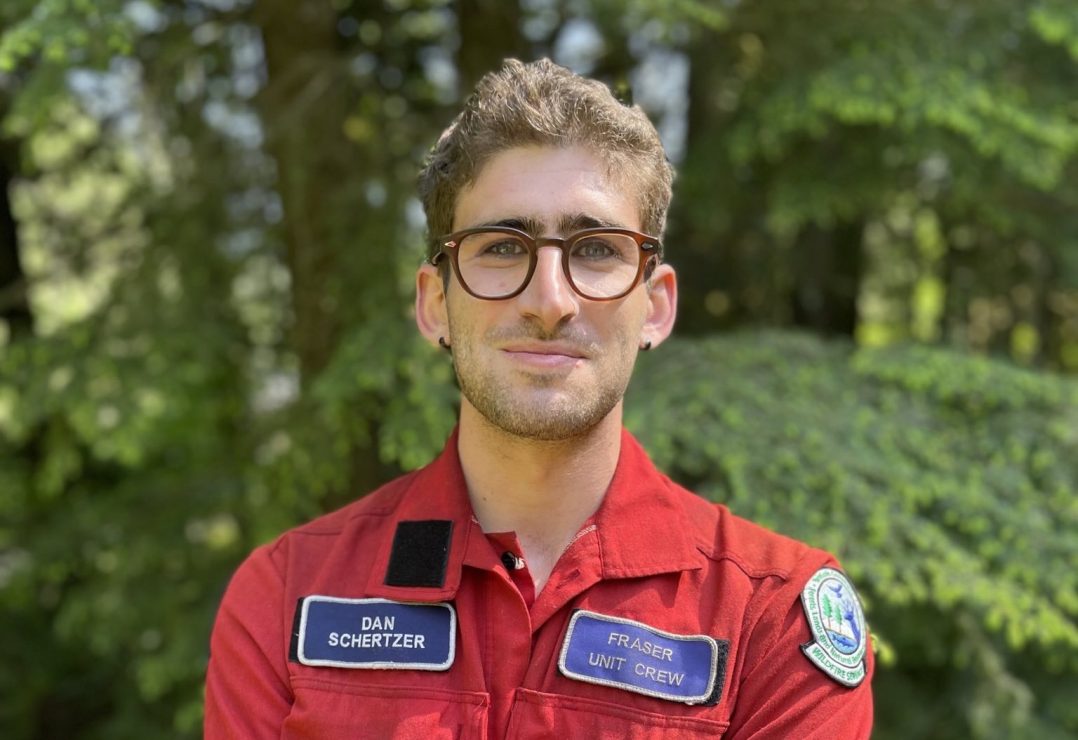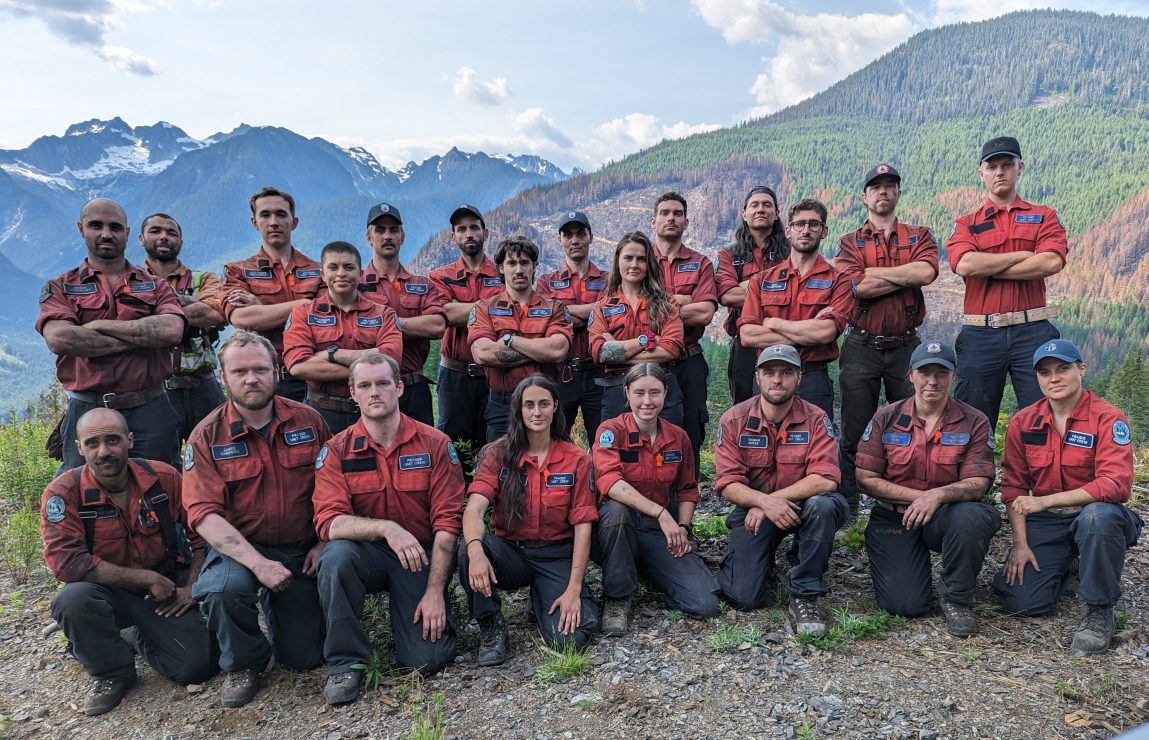The former UVic student opens up about his work in the industry

Photo by Marilyn Haire.
Wildfire fighting probably looks nothing like how you’re imagining it, says Dan Schertzer. In fact, he tells me, oftentimes being asked about his work with BC Wildfire Service feels isolating because of common misconceptions about his job.
The full-time wildfire fighter recently graduated from UVic with a degree in biopsychology and a minor in creative writing. He also spent multiple summers during his degree working for BC Wildfire.
Schertzer says when he returned to UVic for the fall semester after working a wildfire season, he often bristled at his peers’ inquiries about the job.
“I didn’t want people to ask me questions about it,” he says. “I was like ‘How could you relate to this kind of thing?’”
The job is daunting, but it’s not always scary in the way that people generally assume, Schertzer says.
Whether it’s coming from his classmates or loved ones, Schertzer is no stranger to comments about his bravery.
“Nah, man … the scary thing was being tired and hungry for 12 days, it wasn’t running away from the flame,” he says.
This past summer was a busy one. The Fraser Unit Crew, which Schertzer works on, was deployed to fire-ravaged areas of B.C. for two week stint after two week stint, all summer long.
Now, in the wake of the March-to-October wildfire season, Schertzer joins me on Zoom from what looks like a home office, where he sits in a swiveling chair, sipping on a cup of tea.
Schertzer tells me that he has always been drawn to the outdoors. He was born in Michigan and raised in Vancouver, where his family took frequent camping and backpacking trips.
In a roundabout way, his love of nature, first fostered by those family trips, ultimately led him to BC Wildfire.
He joined the Appalachian Mountain Club in high school, which took him on 16-day backpack treks through the forest. He and the rest of the club took turns making food and setting up camp. It was like family camping, he says, but less glamorous.
“I just liked being outside … I can’t quite explain why in particular,” says Schertzer. “I suppose it just makes me happy.”
Later in life, a couple of backpacking trips and a stint on UVic’s rowing team kept his love of the outdoors alive and well. When his time on the rowing team came to an end, Schertzer applied to work with BC Wildfire. He had heard about the job from his rowing teammates.
“It was a weird time, because it was COVID,” Schertzer says of his training with the Fraser Unit Crew in Chilliwack at the end of his third year at UVic.
The typical two-week training camp for new recruits was canceled, so instead, he trained at the firebase — in the warehouse and in their trucks on Chilliwack backroads. On the efficacy of his modified pandemic training, Schertzer simply says that “it worked.”
Working a fire can mean a number of things. If the fire is near the firebase, a deployment means commuting with his unit crew of about 20 to the fire and returning to the base at the end of the day.
In this scenario, Schertzer says, he would get back at 10:30 p.m., wake up the next day at 5 a.m., and work 16 hour days until the assignment was over.
When the fire is too far away to rationalize driving back to the firebase at the end of the day, the crew is deployed to the fire area for up to two weeks.
In the event of a bigger “incident,” as Schertzer calls it, sometimes a fire camp is set up in an area like the town’s local baseball field, complete with food catering, a mess hall, a logistics division tent, and a warehouse.
Other times, “it’s just straight bush camping in the middle of nowhere,” says Schertzer. In these cases, the crew is equipped with 72 hours worth of food for the team, packed into their trucks in large blue tubs.
Sometimes, he says, if the crew puts out the fire within two days of their arrival, and the remaining 10 or 12 days are spent patrolling the fire — walking back and forth, searching for anything that might be left, and smelling for smoke in the air.
“It can be exhausting because you’re hauling gear all day, but it’s a different pace,” he explains. “It’s more dull than you think,” says Schertzer.
For his first couple of years, Schertzer often manned the water pump. This job meant hiking to a water system with a 60 pound water pump (which Schertzer describes as “like a car engine”) and hose gear on his back, connecting the hose system, and sitting by the pump all day long.
“I did that for so many days of my life,” he says. “I would be fighting sleep most of the time.”
Those days, sitting in the forest, making occasional adjustments to the pump system, Schertzer was accompanied only by his thoughts.
“On the job, there’s a lot of simplicity,” he explains. “You get to take a total detox.” This, for him, is one of the most compelling draws of the job.
Schertzer says that when he does trail maintenance, another job that he has spent many days doing, he finds a kind of zen. For this task, he kneels down and, using an axe to rip up roots, dirt, and soil, clears a path for the hose system.
“I used to try to lose myself in trail work completely,” he says. “I became like a trail machine.”
Despite the meditative state Schertzer learned to find on the job, it’s still inherently stressful. Long hours and working “away from your life” cause friction for him and many of the wildfire fighters that he knows.

Photo by Dan Schertzer.
Constant exposure to the devastating effects of climate change is another impossibly burdensome occupational hazard, though Schertzer says that, for the most part, he has become desensitized to the sight and implication of wildfire.
“It’s terrifying. I really don’t think about it consciously, and I don’t think you really can during wildfire season,” Schertzer says, his words clipped. “I remember at one point, [the head of our crew] just looked everyone in the eye and said, ‘It’s all gonna burn. Everything’s going to burn. All of it.’”
And his supervisor was right, to some degree. The crew saw his words come to fruition over the course of three years in Lytton. Schertzer was deployed to Lytton with his crew for the first time in 2021, and returned in both 2022 and 2023 to find the town and the surrounding area increasingly ravaged each year.
If Schertzer had to guess, he would venture that it’ll be a decade before anything new grows in Lytton. He knew on their last visit that the crew wouldn’t be returning to the community for many years.
“There’s nothing left to save there,” he says.
Between the terrifying reality of climate change that Schertzer so often witnesses and the misconceptions around the actual work he is doing on deployment, when people in Schertzer’s life ask him questions about the job, he finds himself feeling reluctant to answer. He says it is crucial to have other wildfire fighters to talk to, in order to combat the inherent loneliness that comes with an emergency response profession like his. For Schertzer, the refuge he finds working outdoors with his crew, who have all become dear to him, is one of the greatest draws of wildfire fighting, along with the meditative work and the simplicity of the lifestyle.
The wildfire fighting life isn’t a balanced one by a long shot, he explains. However, the things he concerns himself with on deployment are few and far between — nature, the fire, his team, and basic survival. Schertzer finds solace in this simpler life, which keeps him coming back, season after season.
Plus, he says, finding love and community in your life and work is essential in fostering hope for the future — whether you find that love in a wildfire crew or anyplace else.
“Being with my crew … feels like you’re with 20 best friends.” He laughs, adding, “You’re all just in it together. You’re all tired together, you’re all hungry together, and you’re all working. You’re all in a bog smelling like garbage. That’s community.”







